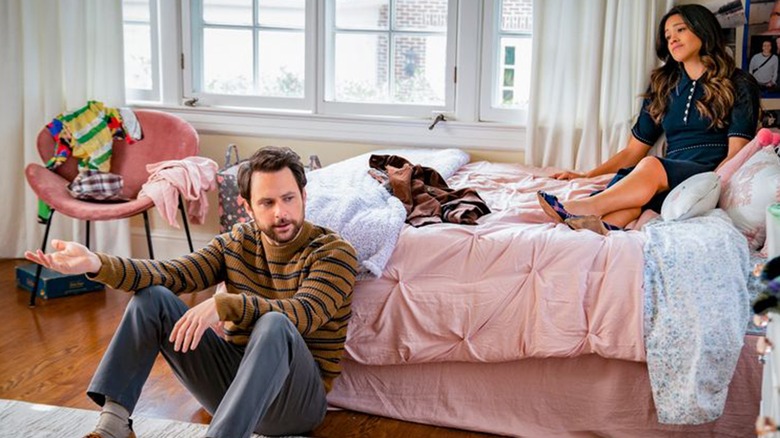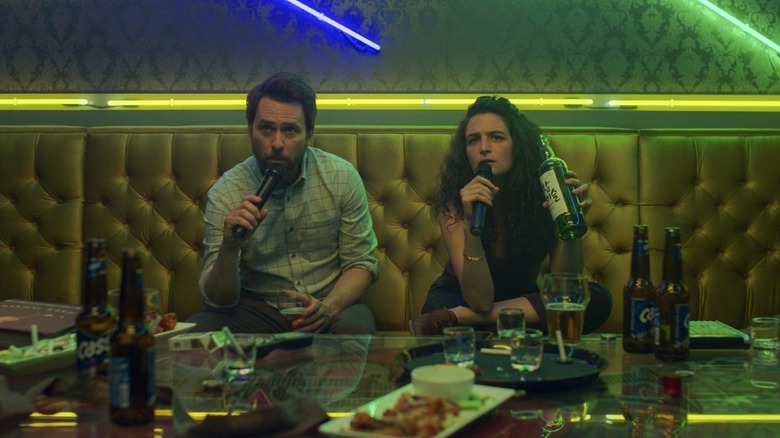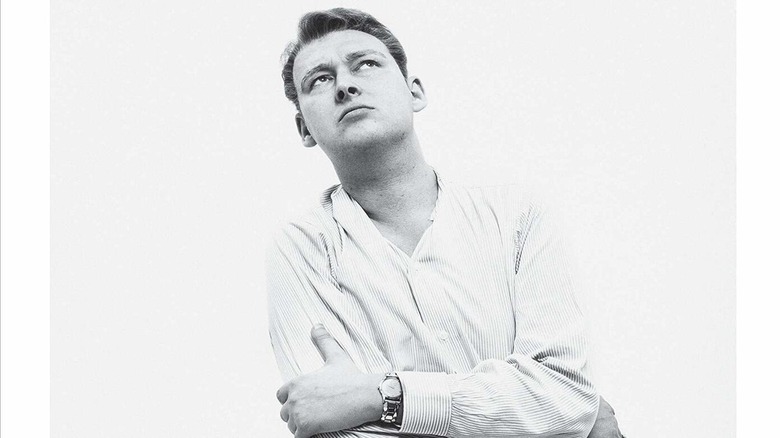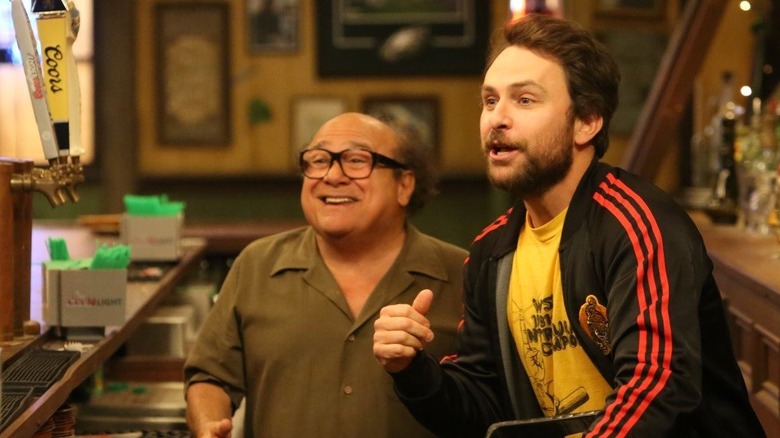I Want You Back Star Charlie Day On Classic Romances, Hollywood Myth-Making, And More [Interview]
Charlie Day has played the best friend in a romantic comedy. Now, he's playing the lead in Jason Orley's "I Want You Back." It's a starring role the actor wanted to keep grounded, but still infuse with the fun and playfulness for which the genre is known. Together, Day and co-star Jenny Slate adeptly walk that fine line in a rom-com about two flawed, heartbroken people trying to sabotage their exes' new relationships.
It's a story that, on paper, could've been more of a horror movie than a romantic comedy. Screenwriters Isaac Aptaker and Elizabeth Berger, as well as Orley, praise Day and Slate for navigating those tricky waters. Given the story, it's impressive how charming the duo are in the movie. Recently, we spoke with Day about why the story works, some of his favorite biographies, why he's ready to adopt an accent in a movie, and having Danny DeVito as a 10,000 pound gorilla in the room.
"It's really the story, right?"
A few minutes ago, Isaac and Elizabeth credited you and Jenny for bringing enough charisma to make these characters get away with more than other actors would. Was that ever on your mind, though?
No, I think they're being generous with us. I mean, what was so strong in their writing and Jason's directing was that they were able to really come up with three-dimensional characters, and oftentimes in a rom-com, maybe Jenny's character and my character will be three-dimensional, but then the ex-girlfriend or boyfriend, like Scott's character and Gina Rodriguez's character, they might be a little bit more one-dimensional. Certainly, the side characters, like Manny's character or Clark's character, tend to be very one-dimensional. They made these people all real people, not stereotypical villains. I think that was the secret to why you're able to go to some broad places, but the movie never feels unrealistic or too heightened.
Yeah, no villains, everyone's just flawed.
Yeah, which is much more the way we all are as people.
When you first read the script, what's your first impression of how to play this guy?
Well, I haven't yet been given a script that someone was asking me to do where I thought, "Okay, this guy needs a limp and an eye patch and a Czechoslovakian accent." I'm usually looking for the ways in which I can relate to the character, and bring aspects of my own personality to the character to make it as real of a person as possible. I'd start with me, and then if there's something to add on, oftentimes there isn't. I looked for the aspects of Peter's character that felt like parts of who I was as a person, and then just tried to make it as real to my own emotions and personality as I could.
Would you want to wear an eye patch and use the Czechoslovakian accent for a role, though?
Oh, I'd be dying to. I think that half the fun of acting is getting to do that, but then, I don't know. You see a Denzel movie and Denzel always feels like Denzel, and you always want to watch him. There's something to be said, too, to create a very honest performance, but it's really the story, right? Like, if you're playing an alien in a Marvel film, it's probably not going to be very similar to who you are as a person. If you're playing a guy who gets dumped by his girlfriend, who works at a retirement home in Atlanta, I don't know — I don't really see a reason to create a persona that seems so different than my own.
Jason told me a few minutes ago that he liked showing a new side of you, though, especially when your character is on the hotel room floor, talking to his ex (played by Gina Rodriguez).
Every time I worked on that scene, I would get choked up reading it. It was just the power of the words. I think as I was doing it, I was doing a lot of takes where my character was breaking down and sort of weeping as he's saying the lines. Jason's like, "No, I don't want all that, that's too much." He was right. He was like, "The character's more resigned." It was really great to get material like this, and be able to play a part where I could have those different levels, and it wasn't like in "Horrible Bosses," where the character's in constant mania. And that's fun. And I love that. But in this character, it's much more well-rounded, highs and lows.
"I'm a sucker for a good Hollywood book."
There's also a scene where your character sneaks into a house, and there's definitely a version of that scene that's very dark and sinister, but how'd you make sure you got the tone of that moment right?
You know, I have to hand that to Jason, right? It's his job as the director to hold the tone of the movie. He's obviously steering me when I'm in scenes, and then he's got scenes where I'm not in it at all. He has to make sure that the other performers are doing the same movie that I'm doing.
He was saying, "I don't ever want you to be too manic," or, "You're playing a very sort of reasonable man. So, you might get into some unreasonable situations, but you have a tendency towards the more rational choice within this situation." And that's why it'll be funny to see a very rational man make this irrational choice, and then how he deals with it.
I learned a lot from Jason while doing it. I think he was always searching for some truth first and foremost, and the comedy would come second. I think that's a good model for how to make a movie. In fact, he had turned me onto the Mike Nichols biography.
That's a great read.
Yeah, a great read. He'd read that, and I read it, and I think we were both in a headspace of, "Let's just try to find something very honest and true, even though this story might get heightened at moments." I think having that goal of [finding] the reality and truth of this moment, beginning to end, helped make it better.
What else did you take away from that Mike Nichols biography?
You know, this sort of speaks to what you were saying about the characters being well-rounded but flawed, you know. Certainly in Hollywood, there's a tendency to build everyone up and create these legends in our mind. But it was nice to read about his struggles as well, and read about the movies where he missed the mark, and understand why a movie worked or didn't. There's no mathematical equation towards making an episode of television, or making a movie that you can plug a story into. The more you can research why something worked, and maybe even more importantly, why something didn't work, I always find biographies like that really educational. That's about as good a guideline as you can get in terms of success and failure, is just looking at the past.
And you never know. Like, he stopped seeing "The Fortune" as a failure and later appreciated it as just a funny movie.
Exactly. Well, there's that side of it, too, which is sometimes you don't like something in the moment, and then you live with it for years and see it with fresh eyes years later, and then you learn to accept it.
Do you read a lot of biographies? Any favorites?
I do like them. I love Sidney Lumet's book on how to direct films. There's a great book actually on the making of "Chinatown," and it has a strange title, because it sounds like "The Long Goodbye." I really enjoyed that one. I'm a sucker for a good Hollywood book, for sure.
Have you read "Conversations with Billy Wilder"? That's a great one on comedy.
No. I should, because we were just talking about "The Apartment" this morning, you know? Does that qualify as a rom-com? I think it does in a way.
I think so. It does get very dark.
It does get dark, but it's romantic and comedic.
Another one that could fall in that category is [Albert Brooks'] "Modern Romance," which Jason said was a reference for this film. Did you two talk much about that one?
I think that speaks to Jason's sense of tone and sensibility. I can't remember if we talked about that one, but we talked about "Broadcast News" a lot. Obviously, a very obvious one is "When Harry Met Sally," because I think it feels both grounded and funny, but also commercial and big. I feel like we wanted to find that balance. We didn't want it to just feel like a heartfelt indie film. We wanted it both real and grounded, but also popcorn, fun, and good old-fashioned entertainment.
Yeah, there were a lot of films that we discussed. I think we talked about a lot of Coen Brothers films, even though they didn't really apply necessarily to this one. Even Woody Allen, never mind his life mistakes, but a lot of his movies are pretty exceptional. Just looking at a lot of great classic romantic films and trying to dissect why one works and one doesn't.
"A 10,000 pound gorilla on your side."
Since you spend a lot of time in writers' rooms, do you approach acting like writing?
I always do, because I think one of the benefits of being a writer is you can see beyond your own dialogue, you can see the bigger picture of the story. Maybe it's quicker or easier to read a script and know what the director's going for. I think there's a real benefit, too, to being in the editing room for so many years.
It's all an education, everything you're doing is in education, and allows you to help someone else. But Isaac and Elizabeth's writing was so good and so strong that there was nothing that I could add from a writing standpoint. Honestly, I approached this film much more from a learning standpoint where a lot of these people, I hate to admit, were younger than me.
I had just a lot that I could learn from both Isaac and Elizabeth's writing, and the way they approached the story. And Jason's directing and the way he approached truth and reality. My role in this was really to function as best as I could as an actor and give it my all. And then, in terms of a producer, just take whatever sort of success and weight I had to make sure that these guys were getting all the tools they needed to be able to succeed.
So, if Jason felt like he wanted to have a certain thing on set, and he was worried that the studio wouldn't give it to him, I was always there to say, "Listen, if you want to be on a riverboat, let's make sure we can shoot on a riverboat." Obviously, I have a good relationship with [producer] John Rickard. This is our fifth movie together. I've had the benefit of that in my life working with DeVito, and having him come into "Sunny" and how useful it was to have a 10,000 pound gorilla on your side.
A great director, too.
And a great director. But I think Danny never really was pushing his director stuff and he said, "You guys have a vision, and I'm here to support your vision." And so that was me with Jason and Isaac and Elizabeth, which is, "You guys have a great vision, help me help you execute it." I wasn't there in any way to tell them how to do it.
Danny DeVito has never directed an episode of "It's Always Sunny in Philadelphia," right?
No, he hasn't. The three of us tend not to do that either, because I think we can create a lot of jobs and opportunities for people by giving them chances to direct the show. Nowadays, it's really about giving people a shot.
"I Want You Back" is now streaming on Prime Video.



